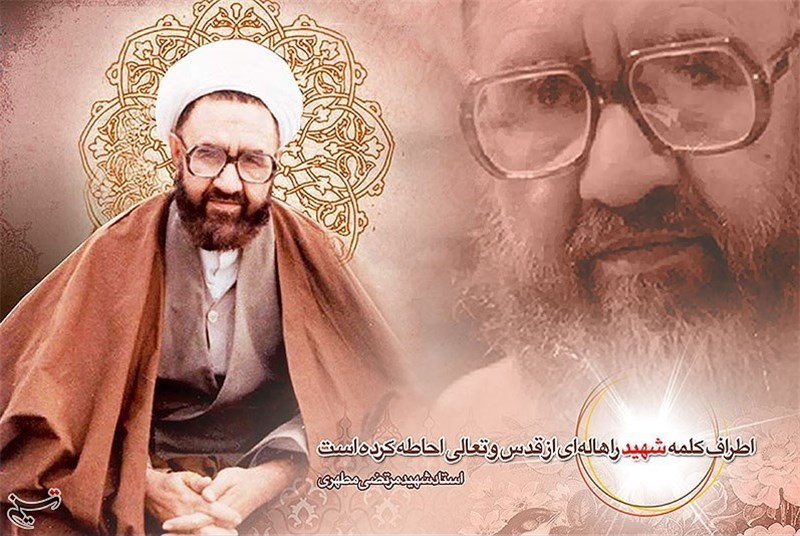In the sunnah, especially in Shiʿi (Shia, Shiite) narrations, the intellect or intellection has been given much importance. One of the merits of Shiʿi narrations compared to non-Shiʿi narrations is the greater importance and authority given to the intellect.
The following is the transcript of a lecture series by Shahīd Murtaẓā Muṭahharī to the Islamic Association of Doctors in Iran, delivered in the years 1973-1974.
Intellection (Taʿaqqul) in the Qurʾan
Islam strongly advocates intellection (taʿaqqul). I shall cite a Qurʾanic verse and a tradition which mentions this verse. We read in Surat al-Zumar:
فَبَشِّرْ عِبَادِ ٱلَّذِينَ يَسْتَمِعُونَ ٱلْقَوْلَ فَيَتَّبِعُونَ أَحْسَنَهُۥٓ ۚ أُو۟لَٰٓئِكَ ٱلَّذِينَ هَدَىٰهُمُ ٱللَّهُ ۖ وَأُو۟لَٰٓئِكَ هُمْ أُو۟لُوا۟ ٱلْأَلْبَٰبِ
“So give good news to My servants who listen to what is said and follow the best of it. They are the ones whom Allah has guided, and it is they who possess albāb.”[1]
The subject begins with “My servants.” It is as if the Qurʾan wants to say that to be Allah’s servant, one must have a certain description and this description would be a requisite for being His servant—that such a servant “listens to what is said.” Samāʿ (to hear) is different from istimaʿ (to listen). Samaʿ means to hear something whether you intended to listen or not. Istimāʿ means to hear but with attention. For example, you take a seat here [in this lecture hall] and prepare yourself for listening [to a lecturer]. Regarding [ḥarām] music, it is said that hearing it is not harām; what is harām is listening to it. The Qurʾan in this verse is describing those who listen to what is said. It means they do not reject any word which they have not yet discerned, and they do not say that they do not want to listen to it. They listen first and then make an assessment and an analysis afterward. They evaluate good and bad, and choose and follow the best of what they have heard. In essence, the verse highlights the independence of the intellect or reason (ʿaql) which must serve as a filter for humankind. He must filter all that he hears, meticulously assessing what is good and bad, and choosing and following the best of it.
The verse continues: “They are the ones whom Allah has guided.” Although this guidance is a rational one, the Qurʾan regards it as divine guidance. They are the ones who truly possess intellect (ulu al-albāb). Albāb is the plural form of the word lubb, which means kernel, not only in the sense of a “mind” but is used in a general sense, and is often used to describe fruits or foods. For example, we speak of a “walnut’s kernel.” Perhaps this is one of those expressions used exclusively by the Qurʾan (as we have not encountered this usage in other texts). Even if it were not the case, we can say that the Qurʾan uses the word “kernel” in many instances in describing the intellect. It is as if the Qurʾan likens man to a walnut or an almond which is entirely covered, but his essential part is his kernel which is located within. If you consider the entire human body and its limbs, his kernel is his intellect or reason. What shall we call an almond without a kernel? We say that it is empty or hollow, and it is thrown away. A person who lacks intellect does not possess the kernel and criterion of humanity; he is a hollow person. He is human in form but not in content. As such, intelligence sums up the meaning of “humanity” to that extent; to be intelligent bespeaks of his independence—“who listen to what is said and follow the best of it.” Basically, one cannot find an expression better than this call for man to support his independence: he must have the power to assess and evaluate. He must be able to analyze issues. A person who does not possess this talent is lacking something essential.
Taʿaqqul in the Sunnah
In the sunnah,[2] especially in Shiʿi narrations, the intellect or intellection has been given much importance. One of the merits of Shiʿi narrations compared to non-Shiʿi narrations is the greater importance and authority given to the intellect. For this reason, social writers today including Sunnis acknowledge that in the Islamic period, Shiʿi reasoning has been stronger than its Sunni counterpart.
Aḥmad Amīn has a famous quadrilogy entitled Fajr al-Islām, Ḍuhā al-Islām, Ẓuhr al-Islām, and Yawm al-Islām. Fajr al-Islām is a single volume treatise. Ḍuhā al-Islām has three volumes. Ẓuhr al-Islām has four volumes. Yawm al-Islām is a one volume book. All-in-all, the quadrilogy has nine volumes. The treatise is very technical and, of course, from a Shiʿi perspective, it has ample points of weakness. In fact, some have even considered it an anti-Shiʿa book, but academically it is no doubt profound.
Although a renowned anti-Shiʿa, in this book Amīn acknowledges that Shiʿi reasoning has always been more deductive. He wants to drive home the point that the reason why Shiʿi reasoning is more deductive is that they are more familiar with speculative interpretations (taʾwīlāt).[3] But the truth of the matter is that the ones responsible for this condition are the infallible Imams (ʿa) who have invited people to thinking and intellection. Amīn says, “For example, philosophy during the Islamic period flourished among the Shiʿa and not as much among the Sunnis. Philosophy was non-existent in Egypt until it was ruled by the Shiʿa. When the Shiʿa came, philosophy flourished. Then, as Shiʿism was no longer dominant in Egypt, philosophy also diminished and was almost non-extant until the last century when Sayyid Jamāl (who was a Shiʿa) came to Egypt and the intellectual market flourished again.” Then he (Amīn) has this pleasant expression:
والحق أن الفلسفة بالتشيع الصق منها بالتسنن
“The truth is that philosophy adheres more to Shiʿism than it does to Sunnism.”
In general, according to him, Shiʿi reasoning is more deductive. The reason for this—which perhaps he did not pay attention to—is that compared to its Sunni counterpart, the Shiʿi tradition has given more importance to it. In scholastic theology (kalām), Sunnis were divided into two opposite camps from the beginning, viz. Muʿtazilites and the Ashʿarites. The Muʿtazilites were more inclined to rationalism while the Ashʿarites leaned more to taʿabbud. The Shiʿa were with the Muʿtazilites; they had a difference of opinion with the Muʿtazilites but in principle they were together. Their commonality was that both gave more value and importance to reason and reasoning. In Shiʿi narrations, there are wondrous expressions about the intellect which cannot be found in Sunni books. Shiʿi books like al-Kāfī, Biḥār al-Anwār, and other hadith collections begin with Kitāb al-ʿAql wa-l-Jahl (The Book of Intellect and Ignorance), followed by sections on Tawḥīd, Prophethood, and Ḥujjah.[4] Of course, reason or intellect is juxtaposed with ignorance which I shall explain. We can see that Shiʿi narrations give remarkable value and respect to reason and its validity.
The Intellect (ʿaql) and Ignorance (jahl) in Islamic Aḥādīth
It is no trifling matter for an Imam to say that Allah has two types of authority (ḥujjah): an outward authority and an inward authority. The outward authority refers to the Prophets (ʿa) while the inward authority denotes the intellects of people.[5] This hadith is an established truths among the Shiʿi aḥādīth, and can be found in al-Kāfī. Now, some may have rejected the purport of this hadith, i.e., whether or not the intellect is actually authoritative. It is not my concern here to refute this objection. In the end of the day, this concept exists (among Shiʿi aḥādīth).
“Ignorance” (jahl) which is mentioned in this tradition is the exact opposite of intellect (ʿaql), and in Islamic narrations, ʿaql refers to the analytical faculty. In most cases you can see, Islam disparages the ignorant. As the opposite of “learned”, jāhil does not mean “illiterate.” Rather, it means the opposite of intelligent. An āqil is one who does not possess this ability. We know of many individuals who are learned yet they are jāhil. They are learned in the sense that they have outwardly vast knowledge. They know many things. Yet, their minds are nothing but storerooms. They have no ijtihād of their own.[6] They have no ability to inference. They cannot analyze issues. According to Islam, such people are ignorant in the sense that their intellects are dull. They may be knowledgeable but their intellects are dull.
We have heard the following narration frequently:
الحكمة ضالة المؤمن
Wisdom is the lost property of the faithful.
No doubt, wisdom means knowledge with real substance, which is profound and deep rooted and not a delusion. That is, the state of the faithful in seeking truths must be like that of a person who has lost something valuable and is always looking for it. There are other narrations which add to this. There was a time when I listed the references for this narration and I found close to twenty versions. One such reference states:
خذوا الحكمة ولو من أهل النفاق…و لو من مشرك
Acquire wisdom even from the people of hypocrisy…even if they may be polytheists.
That is, if you feel that what he has is right and is knowledge or wisdom, do not worry about whether he is an unbeliever, polytheist, impure, or non-Muslim. Go and take it. Wisdom is yours and is only borrowed by him.
أينما وجدها فهو أحق بها
“Wherever he finds it, he is more deserving of it.”
That is, whenever a believer finds wisdom, he must consider himself more worthy to possess it.
Let us not mind this (contemporary) backwards intellectual state of ours in which everything we have is negatively perceived. In the early part of the second century when the spread of Islam was at its height, suddenly texts of all sciences of those outside the Muslim world—Persians, Byzantium, Indian, Greek—were translated and introduced to the Muslim world. What was the reason behind this and why did the Muslim world not show any opposition? The reason was that there are such teachings such as this. These teachings paved the way such that if a book were found even in far-off China, there would be nothing wrong in translating it:
اطلبوا العلم ولو بالصين
Seek knowledge even if it is in China.
For example, ʿAbd Allah ibn al-Muqaffaʿ who translated the book Aristotelian Logic lived during the time of Imam al-Ṣādiq (ʿa); rather, actually from the Umayyad period, but it reached its peak during Imam al-Ṣādiq’s (ʿa) time. During the imamate of some of the Imams during the reign of the Abbasid Caliphs Hārun and Maʾmūn, texts of the primary sciences were voluminously translated. Bayt al-Ḥikmah was a school which was unprecedented in the world at the time and matchless for some time afterward.
Yes, our Imams (ʿa) were critical of the caliphs and exposed their deviations again and again. As the caliphs were accursed and rejected, the Imams (ʿa) unveiled the true colors of these people. Yet, we cannot see even a single tradition or narration of our Imams (ʿa) suggesting that efforts such as Bayt al-Ḥikmah should be treated as a bidʿah in religion.[7] The Imams could have said, “One of the harmful things to have happened to our community has been the translation of scientific texts of the unbelieving nations, such as the Greeks, Byzantines, Indians, and Persians, and the introduction of them into the Muslim world.” This was in spite of the fact that a statement like this would have been among the best means to tarnish their image with the common people. However, we have not seen even a single tradition in which this work of the caliphs was portrayed as an act of bidʿah and therefore contrary to Islam.
My point is that it is a principle which is introduced by Islam itself: “Acquire wisdom even from the people of hypocrisy.” Traditions related to this subject have excellent content. There is a tradition in our collection in which Jesus Christ (ʿa) is reported to have said:
كونوا نقاد الكلام
Be a critic of speech.
That is, just as the money-changer weighs a coin, identifying what is more or less valuable in it and taking the more valuable, likewise you must also be such with respect to speech and points of argument. We take whatever others have [which is valuable and good]. We have our own thinking and intellects. We are not afraid that we are doing something wrong by this. We think about such statements, and we take whatever is good in them and reject whatever is bad in them. Now, what is the basis for this idea: “Acquire wisdom even if it were from hypocrites, the faithless, or from polytheists?” It is this Qurʾanic injunction:
فَبَشِّرْ عِبَادِ ٱلَّذِينَ يَسْتَمِعُونَ ٱلْقَوْلَ فَيَتَّبِعُونَ أَحْسَنَهُۥٓ ۚ أُو۟لَٰٓئِكَ ٱلَّذِينَ هَدَىٰهُمُ ٱللَّهُ ۖ وَأُو۟لَٰٓئِكَ هُمْ أُو۟لُوا۟ ٱلْأَلْبَٰبِ
So give good news to My servants who listen to what is said and follow the best of it. They are the ones whom Allah has guided, and it is they who possess albāb.[8]
A Narration from Imam Mūsā al-Kāẓim (ʿa)
There is a famous narration recorded in al-Kāfī from Imam Mūsā ibn Jaʿfar al-Kāẓim (ʿa) addressed to Hishām ibn al-Ḥakam. Hishām was one of our hadith narrators but he was a narrator who often focused on the doctrinal pillars of faith (usūl al-dīn).[9] In the parlance of that time, he was known as a mutakallim[10] although he himself would likely have been reluctant to accept this label. He used to engage with the theologians. That is, he used to discuss tawḥīd, prophethood, maʿād,[11] and the general principles of religion. There is a consensus of opinion among Sunnis and Shiʿa that Hishām was one of the most distinguished theologians during his time.
Recently, in preparation for writing the book A Historical Study of Mutual Services of Islam and Iran,[12] I read the very profound book, The History of the Science of Theology[13] by Shibli Nuʿmānī, the Indian scholar. In narrating the life of Abū al-Hadhīl Allāf—an outstanding theologian who was of Persian origin and by whose hand many Zoroastrians of Persia became Muslims—I noticed that Nuʿmānī thus wrote: “Everyone would avoid debating with Abū al-Hadhīl who, in turn, would avoid debating with Hishām ibn al-Ḥakam.”
The point is that Hishām, who was highly talented, and academically and intellectually engaged, was spoken to by Imam Mūsā ibn Jaʿfar (ʿa). The Imam (ʿa) told him:
يا هشام! إن الله تبراك و تعالى بشّر أهلَ العقلِ والفهمِ في كتابِه فقال: فَبَشِّرْ عِبَادِ ٱلَّذِينَ يَسْتَمِعُونَ ٱلْقَوْلَ فَيَتَّبِعُونَ أَحْسَنَهُ…
O Hisham! Allah, the Blessed, the Exalted, gave good news in His Book to the people of intellect and understanding: “So give good news to My servants who listen to what is said and follow the best of it. They are the ones whom Allah has guided, and it is they who possess albāb.”[14]
The above noble verse mentions the intellect, which its basic function is analysis, filtering, and separating the correct from the incorrect.
One of the intellect’s functions is the acquisition of knowledge and learning, which is not that important. But to analyze, digest, scrutinize, and separate the correct from the incorrect, it is only then that the intellect in its true sense begins to function.
There are two excellent statements of Abū ʿAlī ibn Sīnā[15] that can be both found in the book al-Ishārāt. One is as follows:
من تعود أن يصدق بغير دليل فقد إنخلع من كسوة الانسانية
Whoever is accustomed to accepting a statement without any reason has ceased being human.[16]
That is, a human being does not accept a statement without reason. On the contrary, it is also bad for a person to reject everything without any reason. He says:
كل ما قرع سمعك من العجائب فذره في بقعة الامكان ما لم يذدك عنه قائم البرهان
Regarding all the strange things that reach your ear, allow for the possibility of it, so long as you have not a proof for or against it.[17]
That is, if you hear something strange, do not reject it so long as you know it could be possible, nor should you accept it outright. Say instead, “It could be so.” A real human being is one whose acceptance or rejection is based on reason, and whenever there is no authority to establish its correctness or incorrectness, that person should say, “I do not know.”
The Necessity for Combining the Intellect and Knowledge
The narration of Imam [Mūsā] (ʿa) is very elaborate. I will only quote parts of it. The Imam (ʿa) then said that one must not be content with the intellect alone. The intellect must be coupled with knowledge. The intellect has an instinctive or natural state which everyone has, and knowledge enhances the intellect. The intellect must be nourished by knowledge. In Nahj al-Balāghah and other hadith collections, the intellect and knowledge are described as such. Sometimes, knowledge is called al-masmūʿ (that which is heard from outside of the self) while sometimes it is referred to as al-matbūʿ (that which is innate within the self). That is, one type of knowledge is described as ʿilm while the other type of knowledge is described as ʿaql. The difference is this: the former is called al-matbūʿ, which implies that it is innate and natural, while the latter is called al-masmūʿ implying that it is a type of acquired (iktisābī) knowledge and not innate. It is greatly emphasized that the “heard intellect” and “innate knowledge” are useful when they both function in their own respective ways. Meaning, people who are passive recipients function simply as storage vessels for pieces of information, and are strongly censured in aḥādīth.
What Bacon Says
In a famous and excellent quotation, Francis Bacon is reported to have said that learned men are of three types. Some are like ants. They always bring grains from the outside and store them. Their minds are like storage rooms. In reality, they are like tape recorders. They record whatever they hear. A second type are those who resemble silk-worms. They weave their own thread from within themselves. They are not really learned men because they do not acquire anything from the outside. They want to produce something out of their imagination. Their impending end, however, is suffocation inside their own cocoons. A third type are those who are like honeybees. They extract the juice of flowers and they produce honey from it.[18]
This question of the “heard intellect” and the “innate intellect” is mentioned in the hadith. “Heard knowledge” is not sufficient if it is not accompanied by its “innate” counterpart. That is, one must digest whatever he or she has acquired from outside through this inward power–this analytical faculty–so as to produce something useful.
Then the Imam (ʿa) said:
يا هشام! ثم بيّن أن العقل مع العلم
O Hishām! It is clear that the intellect (ʿaql) is in alliance with knowledge (ʿilm).
As such, it is stated in the Qurʾanic verse:
وَتِلْكَ ٱلْأَمْثَٰلُ نَضْرِبُهَا لِلنَّاسِ ۖ وَمَا يَعْقِلُهَآ إِلَّا ٱلْعَٰلِمُونَ
And We draw these parables for mankind; but no one grasps them except those who have knowledge.[19]
That is, one must have knowledge at the outset. He must procure the raw material and then have the intellect to analyze it. For example, if I have a strong intellect like that of Abū ʿAlī ibn Sīnā, and the Qurʾan says that history gives very good moral lessons, but I do not have any knowledge of history, what can my intellect understand? Or, we are told that there are divine signs and symbols in this entire world of creation and at the same time I have an excellent intellect, yet I do not know the raw materials of this creation. What can I understand with my intellect, and how can I discover those divine signs? I must discover them through knowledge and understand them through my intellect.
The Question of Taqlīd
يا هشام! ثم ذم الذين لا يعلمون فقال: وَإِذَا قِيلَ لَهُمُ ٱتَّبِعُوا۟ مَآ أَنزَلَ ٱللَّهُ قَالُوا۟ بَلْ نَتَّبِعُ مَآ أَلْفَيْنَا عَلَيْهِ ءَابَآءَنَآ ۗ أَوَلَوْ كَانَ ءَابَآؤُهُمْ لَا يَعْقِلُونَ شَيْـًۭٔا وَلَا يَهْتَدُون
O Hishām! Allah has further censured those who do not exercise their reason with the words, “When they are told, ‘Follow what Allah has sent down,’ they say, ‘We would rather follow what we found our fathers following.’ What, even if their fathers neither applied reason nor were guided?”[20]
We have heard a lot about taqlīd. The Qurʾan has strongly opposed what is known today as “traditionalism,” or the acceptance of whatever was in the past. This sheep-like attitude in man; this blind imitation of predecessors, forefathers, or ancestors merely on the basis of their being forefathers or ancestors. I have noticed that whenever a Prophet (ʿa) encountered his people, there was one thing given emphasis and to which he called his people, but there were two or three common issues encountered by every Prophet (ʿa). Some were positive while others were negative. For example, tawḥīd is something positive presented by every Prophet (ʿa). One of the common things encountered by every Prophet (ʿa) and which every nation dealt with was the imitation of predecessors: “We do not accept what you say because it is something new and we are accustomed to the way of the past generation and our forefathers and we follow their path.” This state of submission to those who were in the past is something against reason. The Qurʾan wants man to choose his way according to his intellect. Thus, the campaign of the Qurʾan against imitation or the so-called “traditionalism” is a campaign in favor of the intellect.
Following the Majority
Another issue is that of number. Just as the sheep-like individual follows his predecessors, man wants to be identified with the majority. As the saying goes, “If you do not want to be disgraced, then join the majority.”
If the majority is a disgrace, then joining it is a disgraceful act. However, man has a strong inclination to join the majority. There are many such cases among the fuqahāʾ.[21] A faqīh infers an issue but he has no courage to express it. He would investigate and see whether or not there is a jurist or jurists who share his opinion. It is very rare for a jurist to express his fatwā (legal opinion) after he finds out that no jurist before him had issued such an edict before. That is, he is frightened when he finds out that he is alone. The same is true in other fields. These days, however, it is as if to be individual has become the fashionable thing, perhaps as the Europeans have inspired. Meaning, the situation has tilted to the other extreme. Everyone strives to be unique and to be known to have a new idea. It is the exact opposite of our predecessors. If they had something to say, our predecessors were reluctant to do it alone. In order to give the impression that they were not alone, they would mention others who share their views. Abū ʿAlī ibn Sīnā thus explained: “Whatever I say, I would quote from Aristotle because if I claim it to be my own, no one would believe it.” Mulla Sadra persisted on quoting his predecessors and explaining his ideas through their words because, at the time, following the majority was in vogue. Today, the case is the opposite. If someone says something which is already said by someone else, it no longer has value. In any case, the Qurʾan condemns taking the majority as the criterion for something being true.
The Imam (ʿa) states that the Qurʾan condemns the majority when it states:
وَإِن تُطِعْ أَكْثَرَ مَن فِى ٱلْأَرْضِ يُضِلُّوكَ عَن سَبِيلِ ٱللَّهِ ۚ إِن يَتَّبِعُونَ إِلَّا ٱلظَّنَّ وَإِنْ هُمْ إِلَّا يَخْرُصُونَ
If you obey most of those on the earth, they will lead you astray from the way of Allah. They follow nothing but conjectures and they do nothing but surmise.[22]
That is, if you follow the majority of people, you will be misguided because they do not follow reason; they follow conjecture and speculation. They follow whatever they speculate. Since most people are like that, you must not trust the majority.
This is in itself another way of giving independence to the intellect and an invitation to the fact that the intellect is the criterion for something being correct.
Not Following the Whims and Caprice of People
The Imam (ʿa) continued in the hadith, saying, “O Hishām! Do not trust what people say. Do not trust their judgement. The judgement must be yours. O Hishām! If there is a walnut in your hand and people say that what is in your hand is a pearl, you should not be deceived by them, since you know that it is indeed a walnut. On the contrary, if you have a pearl in your hand and everyone you meet says that it is a walnut, you should not believe them. If all people say that it is a walnut where in fact it is not, you must follow your own judgement, intellect, and reason as your guide.”
The discussion on intellect ends here for now…We have many citations from the Qurʾan and the sunnah regarding the intellect, and I think we have discussed enough as it relates to education. Islam advocates nourishment, development, and independence of the intellect, and does not advocate its suppression, undermining, or extinction.
————————————————————————
References
[1] Qurʾan, al-Zumar (39):17-18.
[2] Editor’s note: The Arabic word sunnah can be generally translated as “tradition” or “norm.” In the parlance of Shiʿi Islam it refers to the speech and actions of the Prophet Mohammad and the Imams (ṣ).
[3] Editor’s note: Taʾwīl (pl. taʾwīlāt) is a technical term that is translated here as the esoteric interpretation of the Qurʾanic text. It refers primarily to meanings of Qurʾanic statements that are beyond, yet in consonance with, the surface-level meaning of the text.
[4] Tawḥīd means the belief in the Unicity of Allah, the principle belief of Islam. Ḥujjah means ‘authority’, and may refer to any means of obtaining evidentiary value to act a certain way, whether that be a religious text or religious personality, such as a prophet or imam.
[5] The author is referring to the following report from Imam al-Kāẓim: يا هشام إن لله على الناس حجتين: حجة ظاهرة وحجة باطنة، فأما الظاهرة فالرسل والأنبياء والأئمة – عليهم السلام -، وأما الباطنة فالعقول. ” Hishām! God has two types of authority against humankind: an outward authority and an inward authority. The outward (authority) is the prophets, messengers, and imams—peace be upon them. The inward (authority) is the intellects. (Al-Kulaynī, Al-Kāfī, vol. 1, book 1, hadith 12, p. 16.)
[6] Ijtihād generally means to strive or work hard. It technically refers to the process by which a person contemplates, thinks, and researches in order to come to a conclusion. In Islamic law, ijtihād would refer to the process of deriving legal conclusions from religious sources.
[7] Bidʿah generally means innovation. Here it refers to the technical meaning of Islam’s general prohibition of introducing changes or additions into religious practice and attributing them to religion where one has no authority to do so.
[8] Quran, al-Zumar (39):17-18.
[9] Usūl al-Dīn translates to “Principles of Religion”, and generally refers to matters of faith, such as to believe in the Oneness of Allah, the Day of Resurrection, and the Prophethood of Mohammad (ṣ). Usūl al-Dīn can be contrasted with furūʿ al-dīn, which translates to “Branches of Religion” and refers to matters of religious practice, such as prayer, fasting, and bidding others to do good and prohibiting them from evil.
[10] Mutakallim refers to a scholastic theologian.
[11] Maʿād generally means “to return” but here refers specifically to the belief in the Day of Resurrection.
[12] The original title in Farsi is Khadamāt-i Mutaqābil-i Islām wa Īrān.
[13] The original title in Farsi is Tāhrīkh-i ʿIlm-i Kalām.
[14] Muhammad Bāqir al-Majlisī, Biḥār al-Anwār, vol. 1, pg. 132, and Tuḥaf al-ʿUqūl, vol. 1, pg. 383.
[15] [Editor’s Note:] Abū ʿAlī al-Ḥusayn ibn ʿAbd Allāh ibn Sīnā Balkhī, or Ibn Sīnā (c. 980-1037) was a Persian polymath, and arguably the most influential philosopher and physician of the Islamic world.
[16] Al-Ishārāt, or in full, al-Ishārāt wa-l-Tanbīhāt was a later work of Abu ʿAlī ibn Sīnā, consisting of four parts, viz. logic, physics, metaphysics, and mysticism. [Trans.]
[17] Ibn Sīnā, al-Ishārāt wa-l-Tanbīhāt, vol. 3 (Qumm: Daftar Nashr al-Kitāb), 418.
[18] Francis Bacon, The New Organon, Book 1, Aphorism 95.
[19] Qur’an, al-ʿAnkabūt (29):43.
[20] Qur’an, al-Baqarah (2):170.
[21] Fuqahāʾ (sing. faqīh) refers to the class of Islamic jurists.
[22] Qurʾan, al-Anʿām (6):116.
/129





